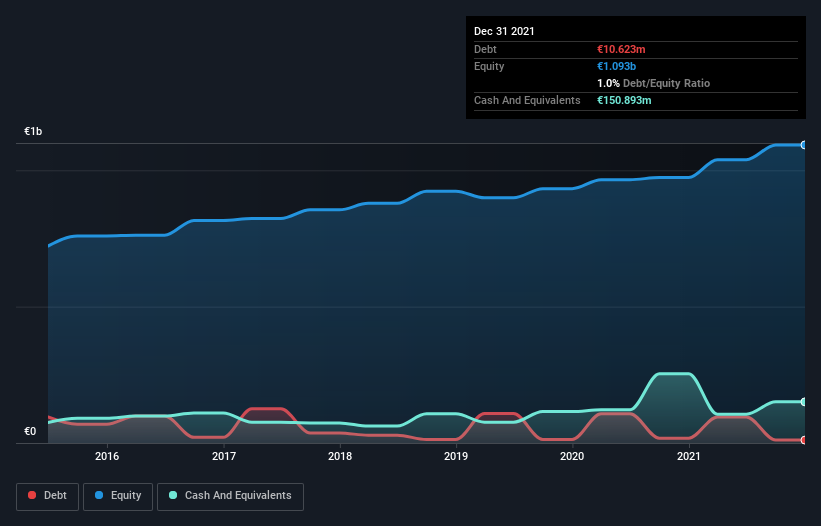- Germany
- /
- Medical Equipment
- /
- DB:PHH2
Here's Why Paul Hartmann (FRA:PHH2) Can Manage Its Debt Responsibly
David Iben put it well when he said, 'Volatility is not a risk we care about. What we care about is avoiding the permanent loss of capital.' So it seems the smart money knows that debt - which is usually involved in bankruptcies - is a very important factor, when you assess how risky a company is. We note that Paul Hartmann AG (FRA:PHH2) does have debt on its balance sheet. But the more important question is: how much risk is that debt creating?
When Is Debt Dangerous?
Debt assists a business until the business has trouble paying it off, either with new capital or with free cash flow. Part and parcel of capitalism is the process of 'creative destruction' where failed businesses are mercilessly liquidated by their bankers. While that is not too common, we often do see indebted companies permanently diluting shareholders because lenders force them to raise capital at a distressed price. Of course, plenty of companies use debt to fund growth, without any negative consequences. When we examine debt levels, we first consider both cash and debt levels, together.
Check out our latest analysis for Paul Hartmann
What Is Paul Hartmann's Net Debt?
You can click the graphic below for the historical numbers, but it shows that Paul Hartmann had €10.6m of debt in December 2021, down from €17.5m, one year before. But it also has €150.9m in cash to offset that, meaning it has €140.3m net cash.

A Look At Paul Hartmann's Liabilities
Zooming in on the latest balance sheet data, we can see that Paul Hartmann had liabilities of €456.2m due within 12 months and liabilities of €275.9m due beyond that. On the other hand, it had cash of €150.9m and €390.6m worth of receivables due within a year. So its liabilities total €190.6m more than the combination of its cash and short-term receivables.
Of course, Paul Hartmann has a market capitalization of €1.19b, so these liabilities are probably manageable. However, we do think it is worth keeping an eye on its balance sheet strength, as it may change over time. While it does have liabilities worth noting, Paul Hartmann also has more cash than debt, so we're pretty confident it can manage its debt safely.
In fact Paul Hartmann's saving grace is its low debt levels, because its EBIT has tanked 35% in the last twelve months. When a company sees its earnings tank, it can sometimes find its relationships with its lenders turn sour. When analysing debt levels, the balance sheet is the obvious place to start. But you can't view debt in total isolation; since Paul Hartmann will need earnings to service that debt. So when considering debt, it's definitely worth looking at the earnings trend. Click here for an interactive snapshot.
Finally, a company can only pay off debt with cold hard cash, not accounting profits. While Paul Hartmann has net cash on its balance sheet, it's still worth taking a look at its ability to convert earnings before interest and tax (EBIT) to free cash flow, to help us understand how quickly it is building (or eroding) that cash balance. During the last three years, Paul Hartmann produced sturdy free cash flow equating to 58% of its EBIT, about what we'd expect. This free cash flow puts the company in a good position to pay down debt, when appropriate.
Summing up
While Paul Hartmann does have more liabilities than liquid assets, it also has net cash of €140.3m. So we are not troubled with Paul Hartmann's debt use. When analysing debt levels, the balance sheet is the obvious place to start. However, not all investment risk resides within the balance sheet - far from it. We've identified 1 warning sign with Paul Hartmann , and understanding them should be part of your investment process.
If you're interested in investing in businesses that can grow profits without the burden of debt, then check out this free list of growing businesses that have net cash on the balance sheet.
New: Manage All Your Stock Portfolios in One Place
We've created the ultimate portfolio companion for stock investors, and it's free.
• Connect an unlimited number of Portfolios and see your total in one currency
• Be alerted to new Warning Signs or Risks via email or mobile
• Track the Fair Value of your stocks
Have feedback on this article? Concerned about the content? Get in touch with us directly. Alternatively, email editorial-team (at) simplywallst.com.
This article by Simply Wall St is general in nature. We provide commentary based on historical data and analyst forecasts only using an unbiased methodology and our articles are not intended to be financial advice. It does not constitute a recommendation to buy or sell any stock, and does not take account of your objectives, or your financial situation. We aim to bring you long-term focused analysis driven by fundamental data. Note that our analysis may not factor in the latest price-sensitive company announcements or qualitative material. Simply Wall St has no position in any stocks mentioned.
About DB:PHH2
Paul Hartmann
Manufactures and sells medical and care products in Germany, the rest of Europe, the Middle East, Africa, Asia and Pacific region, and the Americas.
Excellent balance sheet with proven track record and pays a dividend.
Similar Companies
Market Insights
Community Narratives



